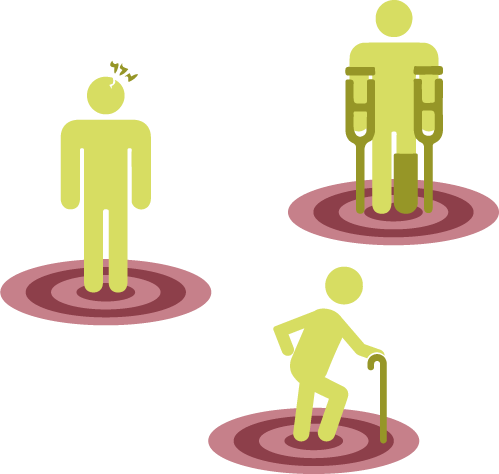Human-to-human (H2H) marketing is exactly what its name implies: it’s a marketing approach that advocates putting people at the center of your strategy. H2H marketing goes beyond customer representation as groups, data points, and even personas, and focuses on personal, one-on-one interactions. H2H marketing recognizes that behind every entity, be it a business, an organization, or a consumer, there is a person who makes decisions based on their own experiences, connections, and trust.
H2H marketing in healthcare can be essential to building trust with patients and establishing a personal connection with them. This trust can make a big difference in how patients feel about their care and even impact their health outcomes. The H2H approach is especially significant to (and basically tailor-made for) small practices and single-physician offices.
But doesn’t it sound quite exhausting to conduct such a strategy? Well, with the right strategy and the right tools, it doesn’t have to be. Let’s explore how healthcare providers can use H2H marketing in healthcare to connect better with their patients, grow their practice, and establish themselves as healthcare leaders in their communities.
Step One: Understanding The Principles of H2H Marketing in Healthcare
The goal of H2H marketing in healthcare is to create genuine, personalized connections with your patients. By focusing on individual needs and concerns, healthcare providers can use marketing to build trust, empathy, and, ultimately, stronger patient relationships and better health outcomes.
 Building Trust Through Marketing
Building Trust Through Marketing
Trust is the cornerstone of healthcare (how groundbreaking, we know), and marketing plays a crucial role in establishing this trust even before a patient walks through your door. Various channels are intertwined into building trust with your audience: from a reliable, trustworthy website, to user-generated online reviews and testimonials and a genuine social media presence, it’s a carefully woven web that demonstrates your commitment and expertise at every step of the patient journey.
Transparency is a staple of H2H marketing in healthcare: this allows patients to understand what they can expect from your practice, your services, and your staff and helps you provide valuable, relevant information and show you care about their needs.
Personalization Over Persona
But we’ve worked so hard on our personas! Well, in that case, you’re a seasoned healthcare marketer who’s adept at changes… Right?
While marketing has historically relied on creating consumer profiles, the so-called “buyer personas” or “target audience profiles”, and continues to refine them towards a consumer-centric approach, these profiles often fail to embody a myriad of traits that, simply put, make a person.
On the other hand, it’s physically impossible (and quite HIPAA-questionable) to market to each potential patient individually. So, how do we solve this conundrum? By adopting patient-centric persona-building techniques and focusing on personality traits, and not only on health issues. To evoke relatability and hit the spot, your messaging must go beyond fear.
Targeted social media interactions and audience engagement can help you get to know your audience better, but don’t forget that your existing patients are a blueprint, too!
Showing Empathy and Understanding through Content Marketing
Empathy in healthcare marketing means understanding and addressing the real concerns and emotions of your patients through the content you create.
The golden rule is to address your patients’ fears and concerns in a relatable way. What does this mean?
Surprisingly, it can mean a myriad of different things, and here’s why: as much as people can be worried about a certain health issue, they can be as equally (or even more!) worried about the financial cost it bears, how the treatment influences their day-to-day, the reactions of their community…
Here’s a bonus tip: speak from experience! Of course, this calls for your experience as a healthcare professional, but also, simply, for your experience as a person, to the extent you feel comfortable with.
You can achieve this through different formats: from blog posts that provide comfort and advice on managing chronic conditions and videos that explain procedures in a reassuring way to social media posts that acknowledge and address common patient anxieties. There are many strategic approaches to each medium, but the core of each is to show that your practice understands and cares about patients’ experiences through marketing messages that resonate on a deeper level and build a stronger connection with your audience.
H2H marketing in healthcare relies on these principles to help small practices and single-physician offices create a more engaging and effective healthcare experience for their patients, improve patient satisfaction, and enhance the overall perception and success of your practice.
Benefits of H2H Marketing in Healthcare for Small Practices
While H2H marketing comes with many advantages, in healthcare, these are mostly mirrored in the patient satisfaction and patient retention process, because patient loyalty (and willingness to recommend you) is the staple of your practice’s financial growth and business stability.
Improved Communication
Personalized communication is at the heart of H2H marketing in healthcare. By tailoring messages and interactions to the specific needs of each patient, you ensure that your communication is relevant and meaningful.
The human-to-human approach helps you better understand patient concerns, leading to more effective and timely healthcare delivery. Personalized follow-up messages, appointment reminders, and educational content can make patients feel more engaged and informed about their health, ultimately improving their overall experience.
Enhanced Patient Relationships
Human-to-human marketing can significantly strengthen the relationship between patients and healthcare providers. By focusing on personalized interactions and understanding each patient’s unique needs, small practices successfully foster a sense of trust and loyalty.
When patients feel genuinely cared for, they are more likely to stay with you long-term as well as wholeheartedly recommend you to their closest friends and strangers on the internet alike.
Patient-Centered Care
H2H marketing allows small practices to offer more patient-centered care. By prioritizing the individual needs and preferences of patients, healthcare providers can create a more supportive and compassionate environment. This approach enhances patient satisfaction and encourages patients to take a more active role in their health management.
Small practices can use personalized patient surveys and tailored health plans to ensure that the care provided aligns with patient expectations and needs.
Improved Patient Retention Rate
When patients feel a strong personal connection with their healthcare provider, they are more likely to remain loyal to the practice.
H2H marketing in healthcare helps in building these connections and improving patient retention rates. Higher retention rates contribute to increased practice profitability, increase Patient Lifetime Value, and help optimize further Patient Acquisition Costs.
Lastly, yet just as importantly, loyal patients are more likely to comply with treatment plans and attend regular check-ups, leading to better health outcomes and reduced long-term healthcare costs.
Streamlined Patient Acquisition: The Circular Model
Happy patients are more likely to share their positive experiences with others, both online and offline. This modern word-of-mouth marketing is invaluable for small practices. Encouraging satisfied patients to leave positive reviews can boost local SEO rankings, increasing the practice’s visibility to potential new patients.
Higher visibility leads to more patient acquisitions, creating a positive feedback loop. Moreover, attracting new patients through positive reviews and strong local SEO can optimize marketing costs, as organic referrals are often more cost-effective than paid advertising campaigns.
Practical Strategies for Implementing H2H Marketing
Implementing H2H marketing in healthcare calls for strategies that balance personalization with HIPAA compliance. Here are our favorite practical approaches for small practices and single-physician offices to create meaningful connections with their patients, improve patient satisfaction, and grow their practices successfully and at a scale.
 Yet Again: Personalized Communication
Yet Again: Personalized Communication
HIPAA limits using personal data in marketing, but you can still find creative ways to personalize communication. For example, segmenting audiences based on health interests allows for tailored newsletters. Using patient names in communications after the initial contact and following up on interactions (like check-up reminders) enhances the personal touch without breaching privacy.
High Social Media Engagement
Social media enables personal engagement with patients. Sharing health tips, success stories, and engaging through comments and direct messages, while ensuring HIPAA compliance, builds community and trust. Regularly posting on popular social media platforms like Facebook, Instagram, and TikTok humanizes your practice and keeps patients connected.
Strategic Content Marketing in Healthcare
Creating content that addresses patient concerns is a powerful H2H marketing strategy. Blog posts, videos, and newsletters on managing chronic conditions and preventive care show empathy and understanding, building stronger connections. Educational content supports patients and positions the practice as a trusted information source.
Honest advice: though there’s almost nothing in the world we take as seriously as our own health, don’t think it’s a reason to always be formal and serious. Popular content trends, even humorous ones, can work in healthcare marketing too, when applied thoughtfully and with taste.
Constructive Feedback: Patient Surveys and Reviews
Streamlining patient surveys and online reviews electronically and through automation provides thorough insights into patient experiences. Actively seeking and responding to feedback shows patients that their opinions matter and that your practice is committed to constant improvement of care. This feedback loop helps identify areas for improvement, enhancing patient satisfaction and loyalty.
Predictive Targeting in Healthcare
Predictive targeting in healthcare can now be used in a HIPAA-compliant way to reach high-value-high-risk patients. By using healthcare-specific tools that analyze anonymized data, healthcare marketers can identify segments for targeted outreach. This approach can help you reach patients in need of high-value medical procedures through relevant marketing that’s respectful of patient privacy.
No Excuses: Efficient Solutions for H2H Marketing in Healthcare
This all sounds lovely, but… While H2H marketing in healthcare offers significant benefits, small practices and single-physician practices can still be overwhelmed by implementing its strategies. Let us employ this approach ourselves, tackle your concerns, and reassure you in a relatable way (or wear out our keyboards trying).
Maintaining Professionalism
You might struggle with balancing personalization with professionalism to ensure that patient interactions remain respectful and appropriate. After all, overly casual communication in healthcare can undermine the professional relationship.
To address this potential issue, establish clear guidelines for communication to maintain a professional tone while being personable. In one-on-one interactions, you can use patients’ names and reference past interactions or health concerns without being too informal.
However, when using social media or responding to patient reviews, always respond respectfully and maintain a professional demeanor, don’t use any patient data except for their publicly available user name on the review platform, and avoid discussing any personal details in this format to comply with HIPAA guidelines.
Training staff on these guidelines can help ensure consistency.
Addressing Time Constraints
Small practices often struggle with time constraints due to limited staff and resources. Personalized communication and engagement can seem time-consuming and overwhelming.
Healthcare marketing automation is a game-changer for healthcare providers eager to apply human-to-human marketing strategies. Implementing automated personalized review requests, reminders, and follow-up messages can save time while maintaining the personal touch.
Additionally, efficient time management strategies, such as setting aside specific times for patient engagement and using templates for common communications, can help streamline the process without sacrificing quality.
Working towards Scalability
As your practice grows, maintaining personalized interactions can become increasingly difficult without overwhelming the staff.
Leveraging healthcare marketing technology can help scale human-to-human marketing efforts effectively. SocialClimb’s comprehensive healthcare marketing platform allows you to implement H2H marketing strategies seamlessly.
Our platform offers centralized reputation management features that allow for automation, streamline electronic patient surveys with higher completion rates and automated reporting, and is the only platform on the market that enables HIPAA-compliant PM/EHR integrations, predictive targeting, and precise conversion tracking in healthcare.
Relying on these healthcare-specific technology solutions will help you track your marketing success, maximize your efforts, optimize your costs, and achieve scalable growth through a personalized approach.











